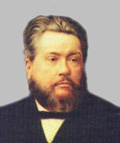 “Enter ye in at the strait gate.” — Matthew 7:13.
“Enter ye in at the strait gate.” — Matthew 7:13.
His name is called Jesus, because “he shall save his people from their sins.” The Son of man hath power on earth to forgive sins.He is exalted on high “to give repentance and remission of sins.”
It pleased God from of old to devise a method of salvation which should be all contained in his only-begotten Son. The Lord Jesus, [in] working out of this salvation, became man, and being found in fashion as a man, became obedient to death, even the death of the cross. If another way of deliverance had been possible, the cup of bitterness would have passed from him. It stands to reason that the darling of heaven would not have died to save us if we could have been rescued at less expense.
Infinite grace provided the great sacrifice; infinite love submitted to death for our sakes. How can we dream that there can be another way than the way which God has provided at such cost, and set forth in Holy Scripture so simply and so pressingly? Surely it is true that “Neither is there salvation in any other: for there is none other name under heaven given among men, whereby we must be saved.”
To suppose that the Lord Jesus has only half saved men, and that there is needed some “work”or feeling of their own to finish his work is wicked. What is there of ours that could be added to his blood and righteousness? “All our righteousnesses are as filthy rags.” Can these be patched on to the costly fabric of his divine righteousness? Rags and fine white linen! Our dross and his pure gold! It is an insult to the Saviour to dream of such a thing. We have sinned enough, without adding this to all our other offences.
Even if we had any righteousness in which we could boast; if our fig leaves were broader than usual, and were not so utterly fading, it would be wisdom to put them away, and accept that righteousness which must be far more pleasing to God than anything of our own. The Lord must see more that is acceptable in his Son than in the best of us. The best of us! The words seem satirical, though they were not so intended. What best is there about any of us? “There is none that doeth good; no, not one.” I who write these lines, would most freely confess that I have not a thread of goodness of my own. I could not make up so much as a rag, or a piece of a rag. I am utterly destitute. But if I had the fairest suit of good works which even pride can imagine, I would tear it up that I might put on nothing but the garments of salvation, which are freely given by the Lord Jesus, out of the heavenly wardrobe of his own merits.
It is most glorifying to our Lord Jesus Christ that we should hope for every good thing from him alone. This is to treat him as he deserves to be treated; for as he is [all-sufficient] and beside him there is none else we are bound to look unto him and be saved.



